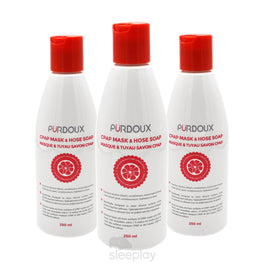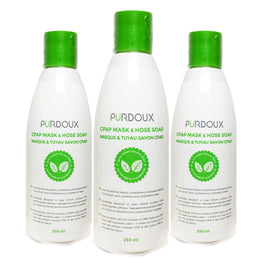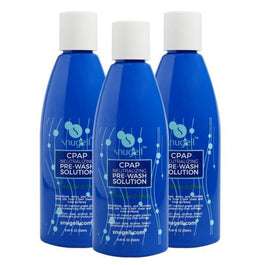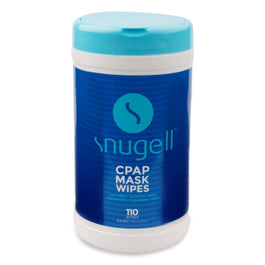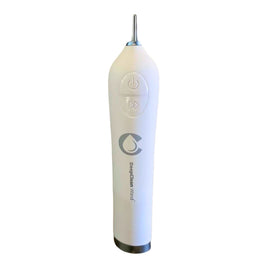CPAP cleaning soaps are mild, residue-free solutions that remove bacteria, oils, and buildup from CPAP masks and hoses without damaging silicone or plastic materials. They’re usually alcohol-free and hypoallergenic, designed to maintain hygiene and extend the life of your equipment.
CPAP therapy is the gold standard for treating obstructive sleep apnea (OSA), helping millions breathe easier and sleep soundly. While your CPAP machine works wonders for your health, keeping it clean is essential. Improper cleaning can lead to bacterial buildup, mold growth, and even reduced machine efficiency—nobody wants that!
Why Is It Important to Clean Your CPAP Regularly?
Cleaning your CPAP equipment reduces the risk of respiratory infections and skin irritation caused by bacterial or mold contamination. Regular maintenance also keeps the device functioning properly by preventing residue or mineral buildup inside the tubing and mask.
Think of your CPAP machine as a high-performance athlete – it needs regular maintenance to stay in top shape. Regular cleaning of your CPAP machine, masks, and tubing is vital for several reasons:
- Bacterial and mold growth can cause respiratory infections.
- Unpleasant odors may make CPAP use uncomfortable.
- Degradation of CPAP components due to dirt and oil buildup.
Sources like the Mayo Clinic and Harvard Health have several studies that emphasize the health risks associated with unclean CPAP devices. [1] [2] Meanwhile, consistent cleaning can also help prevent skin irritation, sinus infections, and other respiratory issues. It's all about keeping things clean and healthy.
How Does Soap Affect CPAP Longevity?
Using the right soap directly impacts how long your CPAP equipment lasts. Harsh ingredients can weaken silicone masks, cause tubing discoloration, and reduce overall performance, while gentle formulations help preserve material integrity and comfort.
-
Avoid Harsh Chemicals: Soaps containing alcohol, bleach, or conditioners can degrade silicone over time, affecting the mask seal and flexibility. According to Pürdoux product specifications, their formula contains no alcohol or bleach, making it safer for daily cleaning.
-
Eliminate Residue Risks: Residue left from standard detergents may cause skin irritation or interfere with airflow. Always choose residue-free, non-toxic cleaning agents made for medical-grade materials.
-
Opt for Mild, Hypoallergenic Formulas: A mild, fragrance-free, pH-balanced soap effectively removes oils and bacteria without damaging your mask or hose. Brands like Snugell and Liviliti focus on hypoallergenic and non-irritating formulations that keep your CPAP components clean and comfortable.
Using a proper CPAP cleaning soap isn’t only about hygiene, it’s about maintaining the durability, safety, and reliability of your equipment over time.
6 Best Soaps to Clean CPAP Equipment in 2025
Regular cleaning with the right soap helps protect CPAP masks, hoses, and humidifier parts made from silicone or plastic. The most reliable options in 2025 share key traits:
- They’re alcohol-free
- Hypoallergenic
- Formulated to leave no residue
These qualities prevent skin irritation and preserve the flexibility of medical-grade materials.
Here are six of the best soaps for cleaning CPAP equipment in 2025:
CPAP Cleaning Soap Comparison Table (2025)
| Product | Hypoallergenic | Fragrance | Main Ingredients | Ideal For | Price Range |
|---|---|---|---|---|---|
| Pürdoux CPAP Mask & Hose Soap | ✅ Yes | 🍋 Grapefruit / Green Tea | Plant-based surfactants, residue-free | Daily cleaning | $11.04 |
| Snugell CPAP Soap Pre-Wash Solution | ✅ Yes | ❌ Unscented | Non-toxic surfactants, no alcohol or dyes | Sensitive skin | $6.38 |
| Liviliti Soap Bubble Pads + Packets | ✅ Yes | 🌿 Mild | SLS-free, alcohol-free, FDA-approved | Travel & home use | $10.20 |
| Dr. Bronner’s Castile Soap | ✅ Yes | ❌ Unscented | Organic oils, sulfate-free | Weekly deep clean | $15.00 |
| Care Touch CPAP Soap Cleaner | ✅ Yes | ❌ Unscented | Mild surfactants, no harsh chemicals | Budget-friendly cleaning | $8.00 |
| Ivory Concentrated Detergent | ⚠ Partial | Light scent | Standard surfactants | General cleaning | $5.00 |
1. Purdoux CPAP Mask & Hose Soap
Pürdoux CPAP Mask & Hose Soap is formulated to clean CPAP masks and hoses made from medical-grade silicone without leaving residue or odor. The mild, hypoallergenic formulation removes oils and buildup while maintaining the flexibility of delicate materials. It's safe for daily use and comes in refreshing Grapefruit & Lemon and Green Tea & Mint scents.
Key Characteristics:
- Alcohol-free, bleach-free, and conditioner-free formula
- Hypoallergenic and non-toxic cleaning agents
- Residue-free and pH-balanced
Usage Recommendations:
- Mix a small amount with warm water, soak your CPAP components for a few minutes, rinse thoroughly, and air-dry. Safe for daily cleaning and compatible with all CPAP machine types.
Pros:
- ✅ Formulated specifically for CPAP equipment (silicone masks and tubing)
- ✅ Gentle yet effective cleaning performance
- ✅ Available in two mild, refreshing scent options
Cons:
-
❌ Some users might prefer an unscented version.
Pürdoux Scented CPAP Mask & Hose Soap-Grapefruit & Lemon

Pürdoux Scented CPAP Mask & Hose Soap-Grapefruit & Lemon
From$12.99
Customer Reviews Summary:
2. Snugell CPAP Soap Pre-Wash Solution
Snugell CPAP Soap Pre-Wash Solution is a mild, fragrance-free cleaner developed for CPAP masks, hoses, and water chambers. Its hypoallergenic, non-toxic formula removes oils and bacteria effectively while protecting silicone and plastic materials from wear. Ideal for maintaining clean and residue-free CPAP equipment.
Key Characteristics:
- Free from dyes, alcohol, bleach, conditioners, and moisturizers
- Hypoallergenic, non-toxic, and residue-free formulation
- Safe for daily contact with silicone mask surfaces
Usage Recommendations:
- Use a small amount in warm water to soak CPAP components for a few minutes, rinse thoroughly, and air-dry. Suitable for both daily and weekly cleaning routines.
Pros:
- ✅ No fragrance or harsh chemicals
- ✅ Gentle on sensitive skin and materials
- ✅ Effective cleaning without residue
Cons:
- ❌ Some users might prefer a scented option.
Customer Reviews Summary:
3. Liviliti CPAP Cleaner Soap Bubble Pads + Packets
Liviliti CPAP Cleaner Soap Bubble Pads + Packets provide a dual cleaning approach for CPAP equipment. The pre-moistened pads are designed for quick daily wipe-downs, while the dissolvable packets offer a deeper weekly clean. Both are gentle on silicone and plastic parts, helping maintain a residue-free and hygienic setup.
Key Characteristics:
- SLS-free, alcohol-free, and non-allergenic formulation
- FDA-approved and suitable for medical-grade materials
- Non-toxic and safe for frequent use
Usage Recommendations:
- For daily maintenance, use a soap bubble pad to clean mask and accessories. For a deeper clean, dissolve one soap packet in warm water, soak components, rinse, and let them air-dry completely.
Pros:
- ✅ Two-in-one system for daily and weekly cleaning
- ✅ Gentle on skin and silicone materials
- ✅ Compact and travel-friendly design
Cons:
- ❌ Pads may dry out if not sealed properly after opening
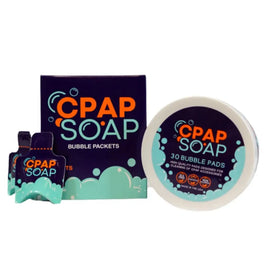
Liviliti CPAP Cleaner Soap Bubble Pads + Packets
4. Dr. Bronner’s Unscented Castile Liquid Soap
Dr. Bronner’s Unscented Castile Soap is a plant-based, organic cleaner that can be safely used on CPAP equipment. Its gentle formulation removes buildup and oils without harming silicone masks or tubing. Made for multipurpose use, it’s suitable for those who prefer natural, fragrance-free cleaning solutions.
Key Characteristics:
- Made from certified organic oils (coconut, olive, and hemp)
- Vegan, fragrance-free, and sulfate-free
- Contains no synthetic preservatives or foaming agents
Usage Recommendations:
- Dilute a small amount with warm water, soak CPAP parts for several minutes, rinse thoroughly, and let air-dry. Recommended for weekly deep cleaning or as an alternative to standard CPAP soaps.
Pros:
- ✅ Organic and natural.
- ✅ Multi-purpose use.
Cons:
- ❌ Requires dilution.
- ❌ May leave a slight residue if not rinsed well.
5. Care Touch CPAP Soap Cleaner
Care Touch CPAP Soap Cleaner is a gentle, fragrance-free option designed for effective daily or weekly maintenance of CPAP equipment. The formula cleans masks, hoses, and water chambers without leaving residue or causing material degradation, making it suitable for regular use on medical-grade silicone.
Key Characteristics:
-
Free from harsh chemicals.
Usage Recommendations:
-
Ideal for daily or weekly cleaning.
Pros:
- ✅ Affordable and easy to use
- ✅ Gentle enough for frequent cleaning
Cons:
- ❌ Limited scent options.
6. Ivory Concentrated Dishwashing Detergent
Ivory Concentrated Dishwashing Detergent is a mild household soap that can be safely used for CPAP cleaning when properly diluted. Its gentle formulation removes oils and buildup from silicone masks and tubing without leaving residue, offering a simple alternative when specialized CPAP soaps are unavailable.
Key Characteristics:
- Mild, pH-balanced formula free from dyes and strong fragrances
- Compatible with silicone and plastic components when diluted with water
Usage Recommendations:
- Mix a few drops with warm water, clean the CPAP parts thoroughly, rinse multiple times to remove any residue, and allow to air-dry completely. Recommended only as an occasional cleaning substitute, not for long-term daily use.
Pros:
- ✅ Easily available and affordable.
Cons:
- ❌ Not CPAP-specific.
How to Choose the Right Soap for CPAP Cleaning
Selecting the right soap for your CPAP equipment helps preserve silicone masks and tubing while keeping bacteria and residue under control. The best soaps clean effectively without leaving chemical traces or causing irritation. Here’s what to consider when comparing options designed for medical-grade materials.
1. Key Ingredients to Look For
The best CPAP cleaning soaps remove oils and bacteria without weakening silicone or plastic parts. A proper formulation prevents buildup, irritation, and residue, ensuring your equipment stays clean and durable over time.
Recommended Ingredients:
- Mild, pH-balanced formulas: Protect materials from wear while maintaining their flexibility.
- Fragrance-free, hypoallergenic components: Minimize respiratory irritation and skin sensitivity.
- Plant-based surfactants: Naturally lift oils and organic buildup without harsh chemicals.
- SLS-free (Sodium Lauryl Sulfate): Prevents residue formation and ensures a gentler clean.
- Alcohol-free formulas: Maintain silicone elasticity and prevent premature material breakdown.
2. Ingredients to Avoid
Certain chemicals can damage your CPAP materials or cause irritation. Avoid soaps containing these substances to protect both your skin and your equipment.
Harmful Ingredients to Skip:
- Bleach or chlorine: Degrades silicone and plastic, leading to cracks, leaks, and premature wear.
- Alcohol-based formulas: Dry out materials and may irritate the skin.
- Conditioners or moisturizers: Leave residues that weaken the mask’s seal and reduce effectiveness.
- Artificial dyes and perfumes: Can trigger allergies or respiratory discomfort.
- Heavy antibacterial agents (like Triclosan): Unnecessary for CPAP cleaning and often too harsh for delicate parts.
3. Scented vs. Unscented Soaps
Fragrance can make a difference in how comfortable your CPAP routine feels, but not all scents are safe for respiratory use. The best choice depends on your sensitivity and the formulation.
✔ Unscented Soaps (Recommended!)
- Free of perfumes and artificial additives, reducing the risk of irritation. This is the safest bet for most people.
- Best for sensitive skin or those prone to allergies. No worries about reactions.
- Leave no lingering odor inside masks or tubing. Fresh and clean!
⚠ Scented Soaps (Use with Caution!)
- Some CPAP-specific soaps (like Purdoux) use natural essential oils for a mild fragrance.
- Avoid strong artificial fragrances that can cause discomfort or interfere with your mask’s seal.
- Always verify that the fragrance source is natural and formulated for medical-grade materials.
How to Clean Your CPAP Machine
Keeping your CPAP machine clean is essential for safe, comfortable, and effective therapy. A consistent cleaning routine helps prevent bacteria buildup, odor, and equipment wear.
Here’s how to do it right — first a quick overview, then a deeper step-by-step guide.
Quick Cleaning Overview (for Daily Reference)
- Unplug and Disassemble: Disconnect the device and separate the mask, tubing, and humidifier chamber.
- Prepare a Mild Solution: Mix fragrance-free CPAP-safe soap with warm water.
- Wash the Parts: Submerge and gently clean the mask, tubing, and chamber.
- Rinse Thoroughly: Remove all soap residue using clean, warm water.
- Air Dry Completely: Let parts dry naturally, away from direct sunlight or heat.
- Wipe the Machine Surface: Use a damp cloth to clean the exterior housing.
Step-by-Step Deep Cleaning Guide
Step 1 – Unplug and Disassemble
Always unplug your CPAP machine before cleaning. Detach the mask, headgear, tubing, and humidifier chamber. Separating each part helps ensure every surface is properly cleaned and prevents moisture from reaching electrical components.
Step 2 – Prepare the Cleaning Solution
Fill a basin or sink with warm water and add a few drops of mild, fragrance-free CPAP soap. Avoid using hot water, bleach, alcohol, or any detergent with harsh additives that can damage silicone and plastic components.
Step 3 – Clean Each Component
Submerge the mask, tubing, and humidifier chamber. Let them soak for 15–30 minutes to loosen buildup. Use a CPAP cleaning brush to gently scrub the inside of the tubing and hard-to-reach corners.
Step 4 – Rinse Thoroughly
Rinse every part under warm running water to remove all traces of soap. Any residue left behind can cause irritation or interfere with your mask seal, so take your time during this step.
Step 5 – Air Dry Completely
Lay the parts flat on a clean towel in a well-ventilated area. Hang the tubing over a rack or shower rod for proper airflow. Avoid sunlight, dryers, or heaters, which can weaken silicone and deform plastic parts.
Step 6 – Wipe the Machine Exterior
Use a damp cloth or CPAP-specific wipes to remove dust from the outer casing. Never submerge the machine itself in water. Keeping the surface clean helps maintain airflow and prevents allergen buildup.
Step 7 – Check and Replace Filters
Reusable filters can be rinsed with warm water and air-dried completely before reuse.
Disposable filters should be replaced every 2–4 weeks, or as indicated by the manufacturer.
For guidance, check Sleeplay’s Product Replacement Times and part finder.
Pro Tip
Keep a separate basin or area for CPAP cleaning to avoid contact with kitchen or bathroom products.
A daily quick wipe combined with a weekly deep clean is enough to keep your therapy safe, fresh, and effective.
Best Practices for Maintaining CPAP Hygiene
Cleaning your CPAP machine once isn’t enough — keeping it clean every day ensures better therapy and prevents bacteria buildup. Here’s how to maintain proper hygiene and extend the lifespan of your equipment.
Daily Cleaning Tips
A quick daily routine helps you stay ahead of grime and germs.
- Wipe the mask and exterior: Use CPAP wipes or a soft, damp cloth each morning to remove oils, dust, and condensation.
- Empty and rinse the humidifier chamber: Pour out any remaining water and rinse with warm water to prevent bacterial growth.
- Dry before refilling: Always let the chamber dry completely before adding new distilled water.
Weekly Deep Cleaning
Dedicate one day per week to a full clean. It takes less than an hour and keeps your setup in great condition.
- Do a full wash: Follow the complete 5-step cleaning routine outlined earlier to wash the mask, tubing, and chamber.
- Inspect for buildup: Check for mineral deposits inside the humidifier chamber. If you spot white residue, clean it thoroughly and switch to distilled water only.
- Rinse thoroughly: Make sure all soap is removed before drying to avoid irritation or residue.
Filter Replacement Guidelines
Filters are the lungs of your CPAP machine — keeping them clean ensures proper airflow.
- Reusable filters: Rinse gently with warm water every week and let them air dry fully before reuse.
- Disposable filters: Replace every 2–4 weeks or as directed by the manufacturer.
- Need help tracking replacements? Visit Sleeplay’s Product Replacement Times for guidance.
Storage Tips
Proper storage prevents dust, moisture, and accidental damage between uses.
- Keep it clean and dry: Store components in a dust-free, ventilated space once completely dry.
- Use a cover: Protect your CPAP machine with a clean cover or case to prevent dust accumulation.
- Avoid humid areas: Keep it away from bathrooms or sinks to reduce mold risk.
Pro Tip
Set reminders for your weekly cleaning and filter changes.
Consistency matters more than frequency — a short, steady routine will always outperform occasional deep cleans.
Helpful Resources
Want to learn more? Check out these helpful resources:
Why Keeping Your CPAP Clean is Crucial
You breathe directly through your CPAP equipment for hours every night, so cleanliness is a top priority. A dirty CPAP machine is a breeding ground for bacteria, mold, and other nasty pathogens. Let's look at why keeping your CPAP clean is so important:
1. Health Risks of Improper CPAP Cleaning
When your CPAP isn't cleaned regularly, it can seriously impact your health. Here's what you're risking:
Bacterial and Mold Growth:
-
The moist environment in CPAP hoses and humidifier chambers is a perfect breeding ground for bacteria, mold, and fungi.
-
Inhaling this contaminated air increases your risk of respiratory infections and lung irritation.
Sinus and Respiratory Infections:
-
Unclean masks and tubing harbor germs, allergens, and dust.
-
This buildup can lead to sinus congestion, throat irritation, and coughing.
Pneumonia & Bronchitis Risks:
-
Severe lung infections like pneumonia can develop from prolonged exposure to unclean CPAP equipment.
-
Studies show that harmful bacteria from dirty CPAP machines can actually reach your lungs.
Skin Irritation & Acne:
-
Oil and dirt accumulation on the mask can cause skin breakouts, redness, and irritation.
-
If you have sensitive skin or allergies, you might experience rashes from a dirty mask.
Unpleasant Odors & Discomfort:
-
Bacteria buildup creates foul smells inside the mask and tubing.
-
Lingering odors make CPAP therapy uncomfortable, and some people even stop treatment altogether because of it.
2. Impact on CPAP Machine Performance
Keeping your CPAP clean isn't just about your health—it also prolongs the life of your machine and keeps it running smoothly. Let’s take a look at some consequences of poor CPAP maintenance:
Reduced Airflow Efficiency:
-
Dust and debris clog air filters and tubing, making it harder for your CPAP to deliver the correct air pressure.
-
This can reduce therapy effectiveness, leading to poor sleep quality.
Increased Wear and Tear:
-
Soap, dirt, and oil residues can degrade silicone masks and tubing, causing leaks.
-
A poorly sealed mask means less effective therapy and air escaping.
Shorter Equipment Lifespan:
-
Water chamber buildup leads to mineral deposits that can damage your humidifier.
-
If CPAP components like hoses and masks aren't cleaned properly, they may need to be replaced more often.
Costly Repairs & Replacements:
-
A dirty CPAP motor has to work harder, which can lead to overheating and premature failure.
-
Replacing CPAP parts due to poor maintenance adds up.
3. Expert Recommendations on CPAP Hygiene
Experts agree that keeping your CPAP clean is essential.
-
ResMed and the Mayo Clinic recommend daily mask and humidifier cleaning and weekly deep cleaning to prevent bacteria buildup. [3] [4]
-
Using a CPAP-specific cleaner (like Purdoux or Snugell) ensures safe and effective maintenance.
-
Following manufacturer guidelines on cleaning and filter replacement helps keep your CPAP machine running like a champ.
Other Essential Cleaning Supplies
Keeping your CPAP equipment clean involves more than just soap and water. Here are some additional cleaning tools that can make your life easier and your CPAP therapy more effective:
1. CPAP Mask Wipes (For Daily Quick Cleaning)
CPAP mask wipes are your best friend for quick, daily cleanups. They remove facial oils, dirt, and residue, keeping your mask fresh between deep cleans.
Best for:
-
Quick daily wipe-downs.
-
Users who travel a lot or don't have time for full washes.
Snugell CPAP Mask Wipes - Aloe Vera
-
Lint-free, high-absorbency fabric ensures no residue is left behind.
-
Made with 100% cotton and Aloe Vera extract, safe for both CPAP masks and your hands.
-
Chemical-free and alcohol-free, designed for daily use.
Individual Unscented Disposable CPAP Wipes (40-Pack)
-
Pre-packaged for on-the-go cleaning.
-
Alcohol-free and lint-free, ensuring irritation-free CPAP use.
-
Infused with Aloe Vera for a gentle, refreshing clean.
Best Practice: Use CPAP wipes daily to remove skin oils and extend the life of your mask. A quick wipe goes a long way!
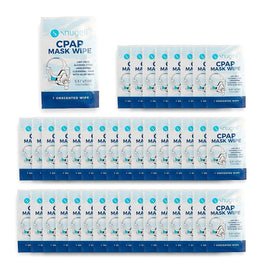
Individual Unscented Disposable CPAP Wipes (40-Pack)
2. CPAP Cleaning Brushes (For Deep Cleaning Hard-to-Reach Areas)
CPAP tubes and water chambers collect moisture, dust, and bacteria over time. Brushes help you remove that hidden buildup, ensuring a truly thorough clean.
Best for:
-
Weekly cleaning routines.
-
Removing debris inside the tubing and humidifier chambers.
CPAP Mask & Tube Cleaning Brush Set
-
Two-brush set:
- 84-inch flexible brush to deep-clean tubing.
- 7-inch small brush for mask crevices.
-
Fits all standard 22mm tubing and masks.
-
Soft nylon bristles clean without scratching.
CSpring DeepClean Wand (For Water Chambers and CPAP supplies)
-
Rotating jet stream dislodges tough residue.
-
Includes four specialized brush heads for a deeper clean.
-
Rechargeable battery-powered, making cleaning easier.
Best Practice: Use a CPAP brush weekly to prevent residue buildup inside hoses and water chambers. Get into all those nooks and crannies!
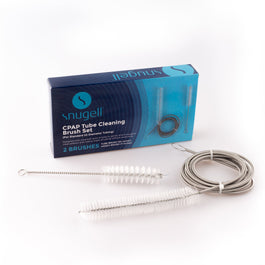
CPAP Mask & Tube Cleaning Brush Set
3. CPAP Cleaning Machines (For Hands-Free Sanitization)
CPAP cleaning machines automate the sanitization process, eliminating 99.9% of bacteria and viruses using UV-C light or ozone-free technology.
Best for:
-
Users are looking for a hassle-free cleaning solution.
-
Those concerned about germ buildup in CPAP accessories.
Liviliti Paptizer UVC LED Smart Sanitizer
-
40 high-powered UVC LEDs destroy bacteria in just 3 minutes.
-
Ozone-free and mercury-free technology for safe use.
-
Large internal tray fits CPAP masks, tubing, and even personal items like phones or keys.
-
Compact and lightweight, easy for home or travel.
Cleaning Bundle with Liviliti Paptizer & Soap (Complete Sanitization Set)
-
Liviliti Paptizer UVC LED Smart Sanitizer for quick sanitization.
-
Liviliti CPAP Soap & Bubble Pads for deep cleaning.
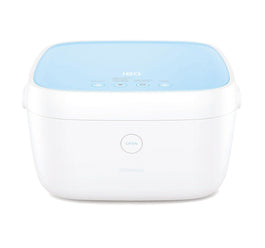
Liviliti Paptizer UVC Led Smart Sanitizer
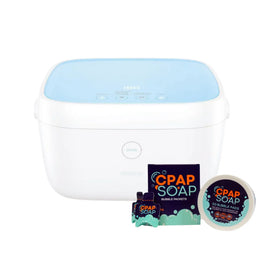
Cleaning Bundle with Liviliti Paptizer & Soap
Helpful Resources:
FAQs
What is the best soap for cleaning CPAP equipment?
The best soap for cleaning CPAP equipment is a mild, fragrance-free, and hypoallergenic soap specifically designed for CPAP use, like Purdoux or Snugell. These soaps are formulated to effectively remove oils and bacteria without damaging delicate CPAP components like silicone masks and tubing. Avoid harsh chemicals, dyes, and perfumes.
Can I use regular dish soap to clean my CPAP machine?
While some mild dish soaps might be okay in a pinch, it's generally not recommended. Regular dish soap can contain harsh chemicals, fragrances, and moisturizers that can damage CPAP equipment or irritate your skin. CPAP-specific soaps are a safer bet.
How often should I clean my CPAP equipment?
Daily cleaning of your mask and water chamber is ideal. This involves a quick wipe-down and rinse. A more thorough cleaning of all components (mask, tubing, humidifier chamber) should be done at least weekly. Don't forget to replace filters according to the manufacturer's recommendations.
What ingredients should I avoid in CPAP cleaning soaps?
Avoid soaps containing bleach, chlorine, alcohol, conditioners, moisturizers, artificial dyes, perfumes, and harsh antibacterial agents like Triclosan. These ingredients can damage your CPAP equipment, cause skin irritation, or leave harmful residues.
Is it safe to use scented soaps for cleaning CPAP equipment?
Unscented soaps are generally recommended. While some CPAP-specific soaps use natural essential oils for mild fragrance, strong artificial fragrances can cause breathing discomfort or mask irritation. If you use a scented soap, choose mild, natural scents and monitor for any adverse reactions.
How do I properly clean my CPAP machine and accessories?
Unplug your machine, disassemble all removable parts, and clean the exterior with a damp cloth. Soak the mask, tubing, and other components in warm water with a mild CPAP-safe soap. Scrub with a CPAP brush, rinse thoroughly, and air dry completely before reassembling.
Can I use baby shampoo to clean my CPAP mask?
While baby shampoo is generally mild, it may contain fragrances or moisturizers that aren't ideal for CPAP equipment. It's best to stick with a CPAP-specific cleaning solution for optimal safety and effectiveness.
What are the health risks of not cleaning my CPAP equipment regularly?
Not cleaning your CPAP equipment regularly can lead to bacterial and mold growth, increasing your risk of respiratory infections, sinus problems, pneumonia, bronchitis, skin irritation, and unpleasant odors that can interfere with your CPAP therapy.
Are CPAP cleaning machines better than using soap and water?
CPAP cleaning machines offer a convenient, hands-free way to sanitize CPAP equipment using UV-C light or ozone. While they're effective at killing bacteria and viruses, they don't replace the need for regular cleaning with soap and water to remove physical debris. They work best in conjunction with traditional cleaning.
What is the difference between CPAP-specific soaps and regular soaps?
CPAP-specific soaps are formulated with gentle, hypoallergenic ingredients that are safe for both your equipment and your skin. They are free from harsh chemicals, fragrances, and additives that can damage CPAP components or cause irritation. Regular soaps may not be as gentle or compatible with CPAP materials.
How do I choose the right soap for cleaning my CPAP equipment?
Look for a soap that is labeled specifically for CPAP use. It should be fragrance-free, hypoallergenic, and free from alcohol, bleach, dyes, perfumes, conditioners, and harsh chemicals. Check the ingredient list to ensure it's safe for silicone and other CPAP materials.
Can I use vinegar to clean my CPAP machine instead of soap?
While diluted vinegar can be used to disinfect some CPAP parts (like the water chamber), it's not recommended as a primary cleaning agent. Vinegar can be harsh on certain materials and may leave a lingering odor. It's best used sparingly and always followed by a thorough rinse with clean water.
What are the best practices for maintaining CPAP hygiene?
Wipe down your mask and machine daily, empty and rinse the water chamber, and perform a full cleaning of all components weekly. Replace filters regularly, store equipment in a clean, dry place, and follow manufacturer's instructions for cleaning and maintenance.
How long should I soak my CPAP equipment in soapy water?
Soaking your CPAP mask, tubing, and other components in soapy water for about 30 minutes is generally sufficient. This helps loosen up any dirt, oils, or buildup before you scrub and rinse.
What should I do if my CPAP equipment smells bad even after cleaning?
If your CPAP equipment still smells bad after cleaning, it may indicate bacterial growth or mold. Try soaking the components in a diluted vinegar solution (followed by a thorough rinse) or consider using a CPAP cleaning machine for sanitization. If the odor persists, it might be time to replace the affected parts.
Can I use antibacterial soap to clean my CPAP machine?
Antibacterial soaps are generally not recommended for cleaning CPAP equipment. They can contain harsh chemicals that can damage CPAP components and may not be necessary for effective cleaning. A mild, CPAP-specific soap is usually sufficient.
What are the best alternatives to soap for cleaning CPAP equipment?
CPAP wipes are a great alternative for quick daily cleanings. CPAP cleaning machines offer hands-free sanitization. For deeper cleaning, you can occasionally use a diluted vinegar solution for certain components, but always rinse thoroughly afterward.
How do I clean CPAP tubing effectively?
Use a CPAP cleaning brush designed specifically for tubing. Run the brush through the tubing to loosen any buildup, then wash the tubing with warm soapy water and rinse thoroughly. Hang the tubing to air dry completely.
What happens if I don’t rinse my CPAP equipment properly after cleaning?
If you don't rinse your CPAP equipment properly after cleaning, soap residue can remain, which can cause skin irritation, affect the mask seal, and even degrade the materials over time. Always rinse thoroughly with clean water until all traces of soap are gone.
Are there any eco-friendly soaps for cleaning CPAP equipment?
Yes, there are eco-friendly options available. Look for CPAP-safe soaps that are made with plant-based ingredients, are biodegradable, and free from harsh chemicals. Dr. Bronner's Castile Soap (unscented) is one example, but be sure to dilute it properly.
References
- Mayo Clinic Health System. (2024). Why Cleaning Your CPAP Is Important.
- Harvard Health Publishing. (2019). Can Your CPAP Make You Sick?
- U.S. Food and Drug Administration. (2023). Cleaning and Maintaining Your CPAP Device.
- ResMed. (2024). Cleaning CPAP Equipment: Tips and Best Practices.
- American Academy of Sleep Medicine (AASM). (2023). Equipment Maintenance Fact Sheet.
- Centers for Disease Control and Prevention (CDC). (2024). Infection Control for Healthcare Providers.


















































